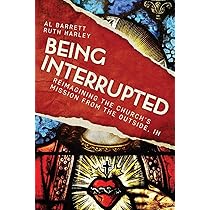Being Interrupted by Al Barrett and Ruth Harley London SCM Press, xvi + 262 Pb, £25.00 ISBN 978- 0-33405-862-5
There are several interconnecting ‘disciplines’ at work in the crafting of these 16 chapters which work together in the offering of an integrated and practical theology of mission. Ecclesiology, missiology, doctrine, biblical studies, theological reflection, cultural and political theory all are used skilfully and insightfully to write a theological vision for ‘being church’. It is a volume that takes some time to ingest given the scope and variety of material. The reader is invited into a dialogue about self-understanding, theological awareness, and the necessity for mission to be informed by the people that make up the communities that the church seeks to serve. In this process there is an attractive relationality established which stands in sharp contrast to some of the anxious and (perhaps understandably) activist models of mission and growth.
The book divides itself into three parts. The first begins with identity and challenges the reader to consider privilege. If we are to ‘read’ the nature and meaning of community then how we see and understand of the location of power is critical.
Brexit and its consequences that we shall live with for many years to come is carefully narrated. The context for this study is Urban Birmingham and from this base Windrush, Grenfell Tower, #MeToo and School strike for climate are narrated and as ‘worked reflections’ of the deadly consequences of injustice and inequality.
The processes by which the reader is invited to step back to explore the nature of gift and connection within a community reflect the fruit of many years work of discipleship. It is grounded in the activity of strengthening relationships where neighbours come together and uncover or rediscover talent, energy, and creativity. What is present is an ‘authority’ that is established through connection and interconnection. This will take time and involve the risk of looking more carefully and differently at what is both in us and around us. These shewings are rooted in worship which empowers and motivates community action. Lives are changed and purposes renewed.
Throughout the text is skilfully illustrated by Ally Barrett who captures models, theories, and spiritual insight. The economy of counting in where numbers and money dominate the discourse is compared to the economy of giving out. Reciprocal and radical interdependence shapes a different view of mission but which clearly bears much fruit.
The second part of this book contains five Bible studies from Mark’s gospel. The theme of interruption unites these encounters especially from the position of those who are either marginalised or excluded. There is a quality of exegesis apologetic that moves the reader on and into a radically different grasp of the nature of mission.
Part three introduces a third economy, ‘being interrupted’ in the form of an extended theological reflection. While there is a slightly different writing style here these chapters build upon the core theme of reimagining mission from the outside in.
This is a volume that is both broad and deep. It must form part of the core reading for any student wishing to think differently about Christian witness. The book might be better read together from within community who have an appetite for change and growth.
In this book there a confidence in and for renewal. The commitment, hard work, ingenuity, and creativity are both moving and inspiring. If every single life matter, then we all must change and change radically in and through our encounter and relationships. This book can enable that process of encounter and change/
Barrett and Harley invite us into a creative discomfort that is both grounded in the soil of the kingdom and the wisdom of the Academy. It is also a stark reminder that activism alone will not renew our commitment to gospel. We also need life-giving theology that can offer a map for the journey ahead.

